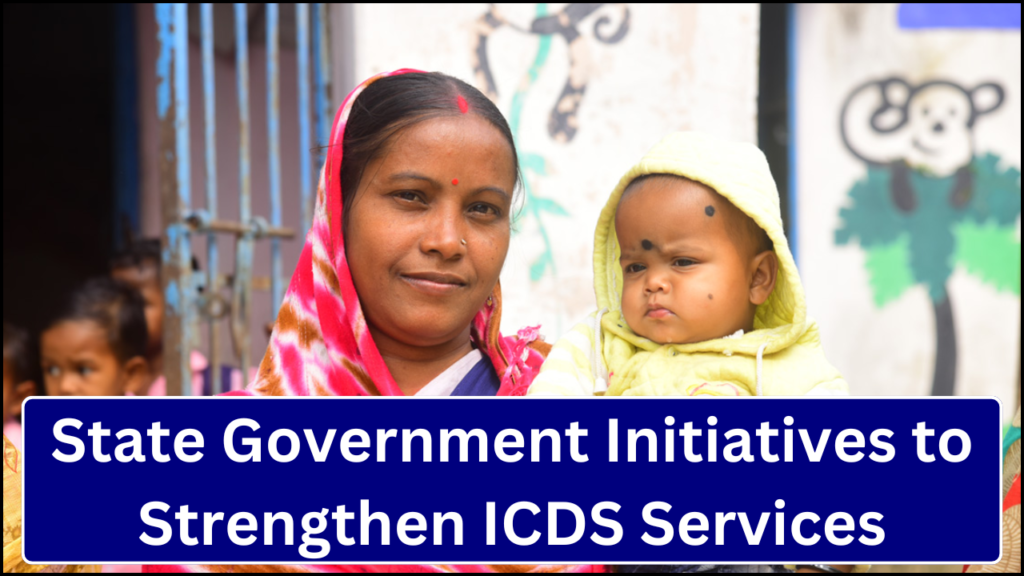
The ICDS scheme is a key initiative by the Govt of India aimed at improving the health and nutritional status of children, pregnant women, and lactating mothers. Various state governments have implemented innovative strategies to enhance its impact and reach.
Key State Government Initiatives
1. Digitalization and Technology Integration
Many state governments have adopted digital solutions to improve the efficiency of ICDS services. Mobile applications and digital platforms help in monitoring the nutritional status of beneficiaries, tracking service delivery, and ensuring transparency. For instance:
- Poshan Tracker App: Several states use this app to collect real-time health and nutrition data.
- E-Anganwadi System: Online portals streamline documentation and enhance accountability.
- Telemedicine & SMS Alerts: Maharashtra and Karnataka have introduced telemedicine facilities and automated reminders for health check-ups.
- AI-Based Monitoring: Some states use AI and data analytics to predict and address malnutrition trends.
2. Supplementary Nutrition Program Enhancements
To combat malnutrition, states have improved nutrition programs by incorporating locally available and fortified foods. Some key measures include:
- Improved Take-Home Rations (THR): Gujarat and Tamil Nadu fortify THR to ensure better nutrition.
- Community Kitchens: Kerala and Odisha provide freshly cooked meals for beneficiaries.
- Millet Inclusion: Karnataka and Chhattisgarh incorporate nutrient-rich millets into ICDS food distribution.
- Local Women-Led SHGs: Some states engage self-help groups to prepare and distribute nutritious meals.
3. Upgrading Anganwadi Infrastructure
State governments have focused on improving Anganwadi centers to create child-friendly, hygienic spaces. Notable initiatives include:
- Model Anganwadi Centers: Upgraded facilities, furniture, and learning tools.
- Solar-Powered Centers: Rajasthan introduced solar-powered units for an uninterrupted power supply.
- Safe Drinking Water & Sanitation: States ensure clean drinking water and build toilets in Anganwadi centers.
- Eco-Friendly Construction: Some states have initiated the use of sustainable building materials.
4. Capacity Building & Training of Anganwadi Workers
Enhancing the skills of Anganwadi workers is a priority for many states. Key initiatives include:
- Skill Development Programs: Regular training on child nutrition, health, and preschool education.
- E-Learning Modules: Telangana provides online training programs for Anganwadi workers.
- Performance-Based Incentives: Some states offer financial rewards for outstanding service delivery.
- Health & Nutrition Ambassadors: Trained workers act as mentors in rural communities.
5. Strengthening Early Childhood Education
State governments have improved preschool education through various initiatives:
- Toy Libraries & Activity-Based Learning: West Bengal and Punjab make early education engaging.
- Integration with Schools: Some states ensure a seamless transition from Anganwadis to primary schools.
- Bilingual Learning Materials: Assam and Meghalaya use multilingual educational resources.
- Smart Classrooms: Some Anganwadi centers now use digital learning aids.
6. Community Participation & Awareness Campaigns
State governments actively involve communities to improve ICDS service implementation. Examples include:
- Mothers’ Groups & Community Committees: Community members monitor ICDS activities.
- Nutrition Awareness Drives: Bihar and Jharkhand run campaigns on healthy eating habits.
- Poshan Maah (Nutrition Month): States promote child nutrition through mass awareness programs.
- Local Festivals & Engagements: Some states integrate awareness programs with cultural events.
Challenges and the Way Forward
Despite progress, states face challenges such as funding shortages, inadequate infrastructure, and staffing issues. Recommended solutions include:
- Increased Budget Allocation: States should enhance ICDS funding.
- Public-Private Partnerships: Collaborations with NGOs can improve service reach.
- Use of AI & Data Analytics: Technology can help in better monitoring and planning.
- Community Empowerment: Encouraging local participation can enhance accountability.
Wrapping Up
State governments play a crucial role in strengthening ICDS services through digitalization, improved nutrition, infrastructure upgrades, and community involvement. While challenges remain, continuous efforts, technological advancements, and better coordination can help ICDS achieve its goals of child and maternal welfare.